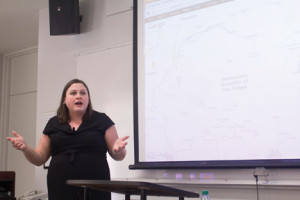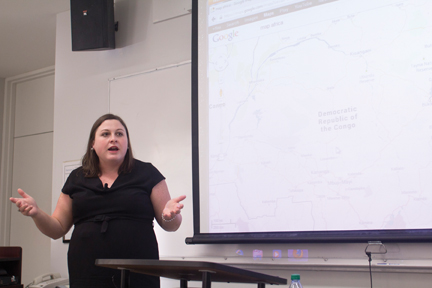
David Wiley and Laura Seay warned SMU students about the unexpected consequences of intervention in Africa during a lecture presented by the Dedman College Interdisciplinary Institute Monday night.
The lecture, entitled, “The Ethics of Intervention in Africa,” was split into two parts, with both speakers addressing the audience of 25 for approximately 30 minutes each. The lecture took place in Hyer Hall.
During the first half of the lecture, Wiley, the director of the African Studies Center at Michigan State University, briefly touched on many instances of intervention in Africa, ranging from Cold War-era interventions to the historical presence of France in the region. While the types of interventions varied, Wiley drove one point home about all of them.
“I am not a pacifist and I do believe that some military interventions are needed,” Wiley said. “However, most military interventions in Africa have increased human suffering, have eroded civil society and civility to address basic human needs and have destroyed or postponed the negotiation to resolve local and national conflicts that are the base of disorder there. Therefore, my conclusion is that there should be great caution when mounting interventions in Africa and elsewhere.”
Seay took over for the second half of the lecture and focused the discussion on the “conflict mineral” trade in the Democratic Republic of the Congo. The four conflict minerals (tin, tungsten, tantalum and gold) are mined in the eastern region of the Congo where there is great unrest with many rebel movements controlling the area. These rebels often control the conflict mineral industry and thus there was a boycott movement across the U.S. spearheaded by the Enough Project that eventually led to the conflict mineral industry in Congo shutting down most of its operations.
“The estimates vary widely and because conflict has gotten worse during this time period we cannot gather data, but it put several tens of thousands and up to two million miners out of work,” Seay said. “Now, if you lose your job in the Congo, you have two options: to be a subsistent-level farmer, which is not a viable economic option, or to join an armed group. There is reason to believe that up to half that lost their job have joined rebel movements.”
Mohammed Saya, a senior studying international relations, was intrigued by the discussion.
“They reminded you that you need to consider all of the potential consequences before action can be taken,” Saya said.









